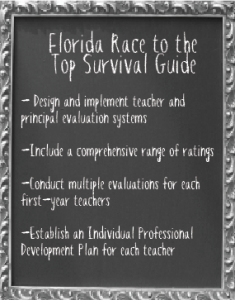 One year to date after his election, President Barack Obama said, “It’s time to stop just talking about education reform and start actually doing it.”
One year to date after his election, President Barack Obama said, “It’s time to stop just talking about education reform and start actually doing it.”
In 2009, The U.S. Department of Education distributed a $4.35 million grant to 12 states to spearhead Race to the Top, a reform program that is a part of the 2009 American Recovery and Reinvestment Act. Florida is a Race to the Top recipient based on its current plans for reform and past ability to increase student achievement.
Race to the Top is meant to help solve Florida’s teaching woes; however, its requirement of a Teacher Evaluation System has done more harm than good. Orange County, and other counties in Central Florida, have chosen Dr. Robert Marzano’s Teacher Evaluation System. This system’s time consuming methods are unhelpful to teachers and students.
The main goal of TES is improving teaching strategies and student understanding. A key difference between TES and the old system is the latter required one teacher evaluation yearly and passed 99 percent of its teachers.
With the old system, teachers on tenure could have been excluded from this requirement because administration expects those teachers to be able to teach effectively. If a teacher was to let his professional edge slip, his ineffective behavior could potentially go unnoticed for years. Even so, the Robert Marzano Teacher Evaluation System’s cons outweigh the pros.
The new system requires four informal evaluations and two formal evaluations for all inexperienced teachers. Veteran teachers will have two informal and one formal. An informal evaluation consists of a campus administrator observing 15 minutes of a class period. The new need for administrative “surveillance” in classrooms can leave veteran teachers feeling demoralized and frustrated, which can hurt teacher morale.
Formal evaluations require time teachers do not have. Teachers receive questions to answer about how they think they are doing as a teacher. After these questions are answered, an administrator and the teacher will meet to discuss them, probably during said teacher’s planning period. Then, the teacher will have a class period evaluation and a debriefing with the administrator in another planning period.
The evaluation is based on six categories: Lesson Segments Involving Routine Events, Lesson Segments Addressing Content, Lesson Segments Enacted on the Spot, Planning and Preparing, Reflecting on Teaching and Collegiality and Professionalism. What is especially new is Lesson Segments Involving Routine Events. This category includes the new use of learning goals and a scale system.
While this could potentially help students learn, currently it is not. Guidelines for an effective learning goal are not clear, and honestly, the scale concept is dumb. No student wants to raise his hand with a one to five rating on it to show how much he understands. No student wants to record this in a journal or on an assignment either.
Students mentally know where they are. If they do not understand, they ask questions. The scale system is meant to emphasize student understanding. However, teachers can simply ask their classes, ‘are there any questions?’ This eliminates time wasted copying down scales on assignments and re-referencing the scale in class.
Teachers are given 49 minutes per class period, which is not enough time for this system to work. Teachers already work hard to teach students, and asking them to create a learning goal and scale for every lesson is excessive when they have created other practices known to reach students like calling on a student to answer another student’s question to ensure classroom understanding.
For first year teachers, this system can be effective because it covers essentials for running a classroom, but for an experienced teacher who knows how to do his job, it wastes time and is unnecessary. As for the ineffective tenured teacher, a thorough yearly evaluation would make sure he is teaching adequately.
//